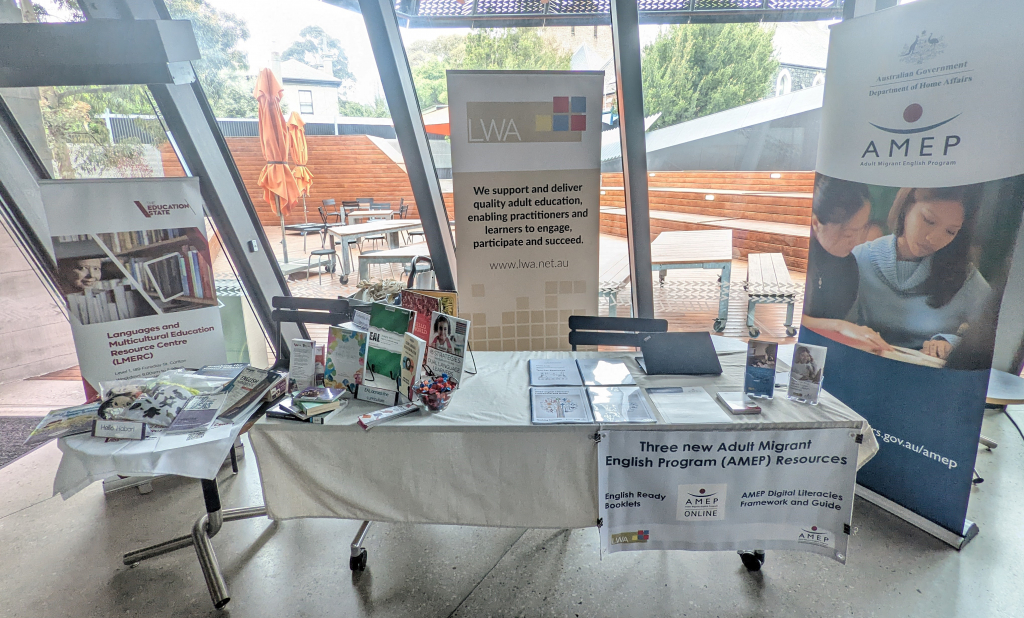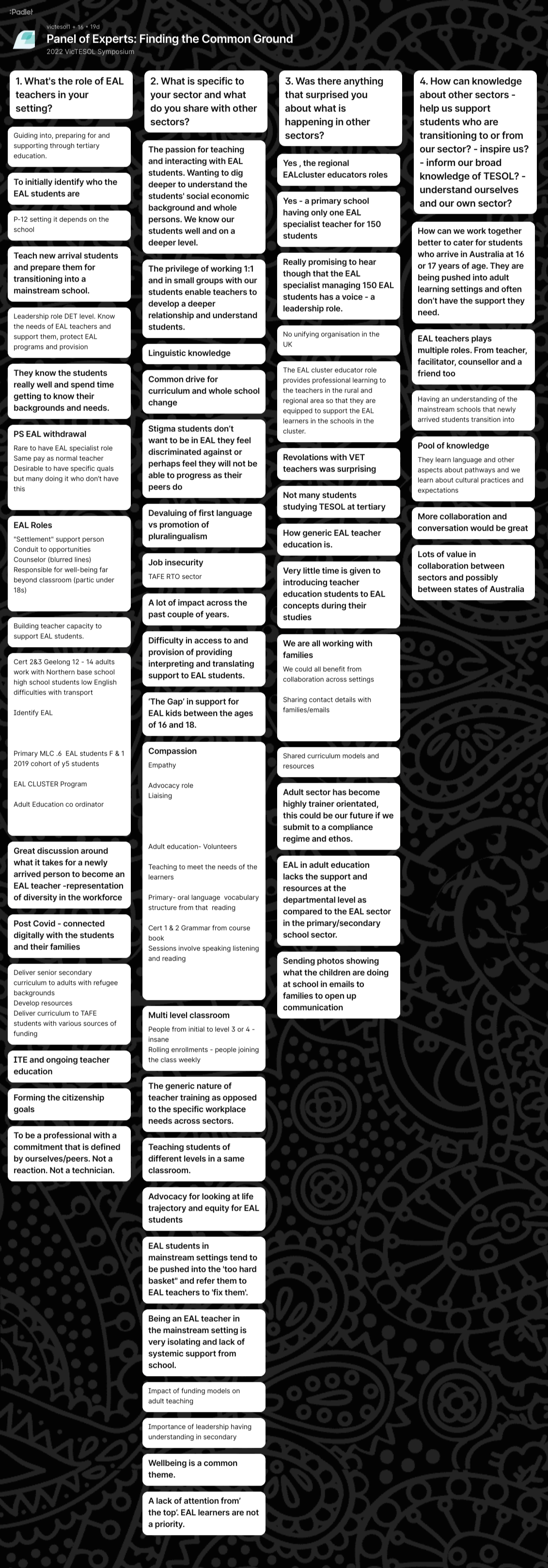Read the December VicTESOL eBulletin online now.
Click here to read online.
And if you would like to subscribe to receive future updates please click here.
Read the December VicTESOL eBulletin online now.
Click here to read online.
And if you would like to subscribe to receive future updates please click here.
The (adult) EAL Framework curriculum will be reaccredited from 1 January 2024. The EAL Framework reaccreditation Project Steering Committee (the Committee) has been established by the curriculum owner to support the reaccreditation process and will confirm the course content is appropriate and meets the required outcomes. The Department of Home Affairs is represented on the Committee along with industry representatives, RTOs and curriculum experts.
Over the coming months the Committee is seeking feedback on the draft content. To facilitate this process the Department has enlisted support from LWA to seek and compile provider feedback through Survey Monkey. LWA is currently searching for feedback on draft units for:-
Feedback for this tranche should be provided by COB Tuesday, 14 February 2023 via the online survey here https://www.surveymonkey.com/r/KJWS75F
Any additional feedback can be emailed to info@lwa.net.au
If you have any queries regarding the above or below attachments, or you have any issues completing the online survey, please do not hesitate to email info@lwa.net.au
Draft Units
The (adult) EAL Framework curriculum will be reaccredited from 1 January 2024. The EAL Framework reaccreditation Project Steering Committee (the Committee) has been established by the curriculum owner to support the reaccreditation process and will confirm the course content is appropriate and meets the required outcomes. The Department of Home Affairs is represented on the Committee along with industry representatives, RTOs and curriculum experts.
Over the coming months the Committee is seeking feedback on the draft content. To facilitate this process the Department has enlisted support from LWA to seek and compile provider feedback through Survey Monkey. LWA is currently searching for feedback on draft units for:-
Feedback for this tranche should be provided by COB Tuesday, 31 January 2023 via the online survey here https://www.surveymonkey.com/r/7LY38BW
Any additional feedback can be emailed to info@lwa.net.au
If you have any queries regarding the above or below attachments, or you have any issues completing the online survey, please do not hesitate to email info@lwa.net.au
Certificate II in EAL (Access)
Certificate III in EAL(Access) (please note new unit VUXX74 Investigate Australian Identity)
Certificate IV in EAL (Access
Kellie Heintz, as the EAL Curriculum Manager of the VCAA, presented a clear and insightful presentation on the flexibility of Units 1 and 2, building on earlier presentations around the new English/EAL Study Design. She offered a specific focus on Unit 1, Outcome 1 – Personal response – and how this outcome allows students to explore identity and the self in relation to the text of study through inferences they make around key ideas or events. For Unit 1, Outcome 2 – Crafting Texts she reminded us of the role of the mentor texts to introduce ideas. She provided multiple examples of mentor texts and ideas around the types of written texts students can create. Of note, she drew our attention back to the role of VCE teachers as having significant agency in Units 1 & 2 – that we can make decisions around offering a broad range of assessment opportunities that scaffold EAL students whilst developing their voice through writing, speaking and listening.
The presentation revealed the significant work Kellie and the VCAA have invested in listening to EAL students and teachers in the new design of these outcomes. A wonderfully clear and insightful session that supported planning for both VCE English and EAL teachers.
The following resources may be of assistance in your planning
The VCAA EAL website
https://www.vcaa.vic.edu.au/curriculum/vce/vce-study-designs/english-and-eal/Pages/Index.aspx
Planning
https://www.vcaa.vic.edu.au/curriculum/vce/vce-study-designs/english-and-eal/Pages/Planning.aspx
Teaching and Learning
https://www.vcaa.vic.edu.au/curriculum/vce/vce-study-designs/english-and-eal/Pages/TeachingandLearning.aspx
Assessment
https://www.vcaa.vic.edu.au/curriculum/vce/vce-study-designs/english-and-eal/Pages/Assessment.aspx
On Demand Videos
https://www.vcaa.vic.edu.au/news-and-events/professional-learning/VCE/Pages/VCEEnglish.aspx
LWA were pleased to share a table with LMERC (Languages and Multicultural Education Resource Centre) at the VicTESOL Symposium on Friday 11th November 2022. It was great to showcase with LMERC resources that related to second language acquisition and language teaching methodology for all levels, from early years to adults.
The AMEP 3 new resources: the English Ready Booklets, AMEPOnline, and the Digital Literacies Framework, Guide, and companion Teaching Resources were of great interest to symposium participants and the participants are looking forward to their publication on the Australian Department of Home Affairs website (Adult Migrant English Program page).
The Symposium provided me with a wonderful opportunity to meet so many EAL educators and the sessions were very informative. Being new to LMERC, I enjoyed chatting about what we provide and what is important to you. We appreciate any suggestions/recommendations for resources.
LMERC is a specialist resource centre for educators across all sectors with both digital and physical resources to support EAL teaching and learning. This includes academic and practical teacher resources; culturally inclusive fiction and non-fiction; games and storytelling kits and realia (puppets, masks, clothes and toys).
We regularly provide bi-lingual dictionaries and picture books, readers and other resources to support your students in schools across Victoria. If you need any resources, you can visit us in Carlton, email for suggestions or look through our catalogue and request items. We have a growing collection of ebooks and audio books that you can access through the catalogue.
We send a newsletter once a term with information about our new resources, professional learning opportunities and relevant articles. Please email if you would like to receive the newsletter.
Telephone: (03) 9349 1418
Catalogue: lmerc.softlinkhosting.com.au
Opening hours: weekdays 9am-5pm, including school holidays
How to Join LMERC and select Register in the top right-hand corner

Summary and Resources to come
Recording to come
Following the keynote video presentation and panel discussion, symposium participants broke into four groups to unpack the ideas and concepts presented. This acted a teacher-sharing and networking session, facilitated by VicTESOL committee members, where participants worked in small, multi-sectorial groups to discuss their learnings and how this applied to their context.
Groups captured their discussion using a shared Padlet page, guided by the following questions:
1) What’s the role of EAL teachers in your setting?
2) What is specific to your sector and what do you share with other sectors?
3) Was there anything that surprised you about what is happening in other sectors?
4) How can knowledge about other sectors
• help us support students who are transitioning to or from our sector?
• inspire us?
• inform our broad knowledge of TESOL?
• understand ourselves and our own sector?
After the Padlet activity, the small groups then reported back to the facilitator and larger group, which enabled a rich discussion that drew on a wealth of experience and knowledge. It was a valuable opportunity to explore and celebrate the similarities and differences across early childhood, primary, secondary and adult sectors, within local, state, national and international contexts. The aim is that this session will lead to the development of a shared resource, which will be published on the VicTESOL website. VicTESOL extends their gratitude to the participants for sharing their expertise and experience and their contributions to this resource.

The symposium kicked off with an engaging panel discussion facilitated by Assoc Prof Russel Cross in response to the keynote presentation by Prof Ben Rampton and Dr Mel Cooke. Panel members from the primary, secondary, Catholic and adult sectors shared their insights on the role of EAL teachers in their setting, how much EAL teachers have in common across settings, how policy and curriculum shape the work of EAL teachers and what the important aspects are of an EAL teachers’ role in different settings. The discussion illuminated a shared passion across all sectors for the holistic needs of EAL learners and the unique and privileged role that EAL teachers play in the lives of learners that goes far beyond curriculum, pedagogy and assessment. The panel ended with thematic conclusions from Ben and Mel, who had watched the discussion via zoom from the UK.
Summary to come
In their session “Impacts of Trauma on Learning and Behaviour”, Allison Greene and Matt Roger from Foundation House presented insight into the practical strategies and theories to support students impacted by refugee experiences. Allison and Matt began by providing some of the theory around refugee trauma and then invited participants to investigate 2 fictional case studies of students from refugee backgrounds. In small groups, teachers discussed some of the concerns that were evident relating to the students’ learning, engagement and behaviour and then shared some possible strategies to support them in their transition to Australian schooling.
The provision of knowledge and practical examples provided by Allison and Matt, along with the reflective discussion, assisted educators to develop their trauma informed lens. The session allowed for participants to explore connections between trauma reactions and supportive responses, and consider how our various educational settings can be a restorative space for students and families from refugee backgrounds. Participants in the session were given some excellent resources to take away which included further strategies and support for teachers when dealing with students’ trauma reactions and disclosures. For further information, resources and professional learning educators can visit the Foundation House website at https://foundationhouse.org.au/.